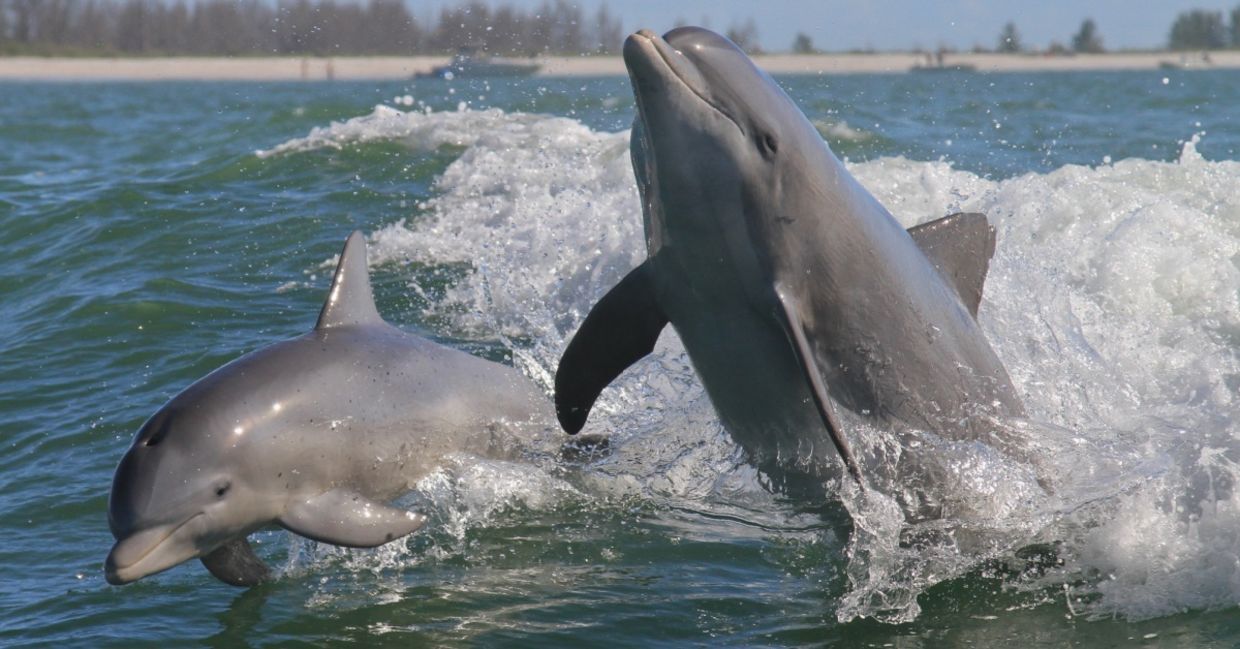
(Tory Kallman / Shutterstock.com)
Dolphins are beautiful aquatic mammals that are found in waters around the world. Dolphins live in social groups called pods and are highly intelligent. In fact, they may be the most intelligent animals on the planet.
According to EcoWatch, dolphins communicate with one another by using clicks, whistles, and other vocalizations, even using signature whistles that serve as names. Now, recent research from the Woods Hole Oceanographic Institution (WHOI) in Massachusetts has been studying non-signature Dolphin vocalizations and has identified communications that appear to be language-like.
About the Research
Non-signature whistles (NSWs), make up around half of the communications produced by the dolphins that live in the waters around Sarasota, Florida and are less frequently studied than signature whistles, EcoWatch explained. That’s why this research is particularly important.
“Signature whistles are individually distinctive whistles that function much like human names. Non-signature whistles are all whistles other than signatures. We have only very recently started studying them and know very little about them, but we have found evidence for widespread sharing of a variety of stereotyped non-signature whistle types,” biologist Laela Sayigh, leader of the WHOI research team, told EcoWatch.
The research team which included partnering with the Brookfield Zoo Chicago’s Sarasota Dolphin Research Program and other institutions used playback experiments to identify distant (NSWs), whistles that were used by multiple dolphins for communication.
The recordings were made by placing digital acoustic tags and noninvasive hydrophones on the dolphins during catch and release health assessments. The team identified 22 shared NSWs that were produced by at least 25 different bottlenose dolphins.
This is “an idea that is supported by the fact that dolphins are flexible, life-long vocal production learners, unlike most other non-human mammals,” the authors wrote in the study.
The Coller Dolittle Challenge
The researchers were the winners of the inaugural Coller Dolittle Challenge for their work in identifying language-like communication in dolphins, according to a press release from the Woods Hole Oceanographic Institution.
The challenge from the Jeremy Coller Foundation and Tel Aviv University awarded a prize for research about animal communications. The four finalists used technology to study the communications of dolphins, monkeys, nightingales, and cuttlefish.
“Humans share this planet with millions of other species, but for far too long we’ve only talked amongst ourselves. The Coller Dolittle Challenge aims to change that so I’m excited by the fascinating work Laela and her team have done on dolphin communication,” Jeremy Coller, founder of the challenge said in the press release.
Going forward, research into animal communications may someday allow people to speak with other species that share the planet.
YOU MIGHT ALSO LIKE:
Elephants Call Each Other by Name
Dolphins Know How to Stay in Touch!
New Projects Use AI to Teach Humans How to Speak Whale







